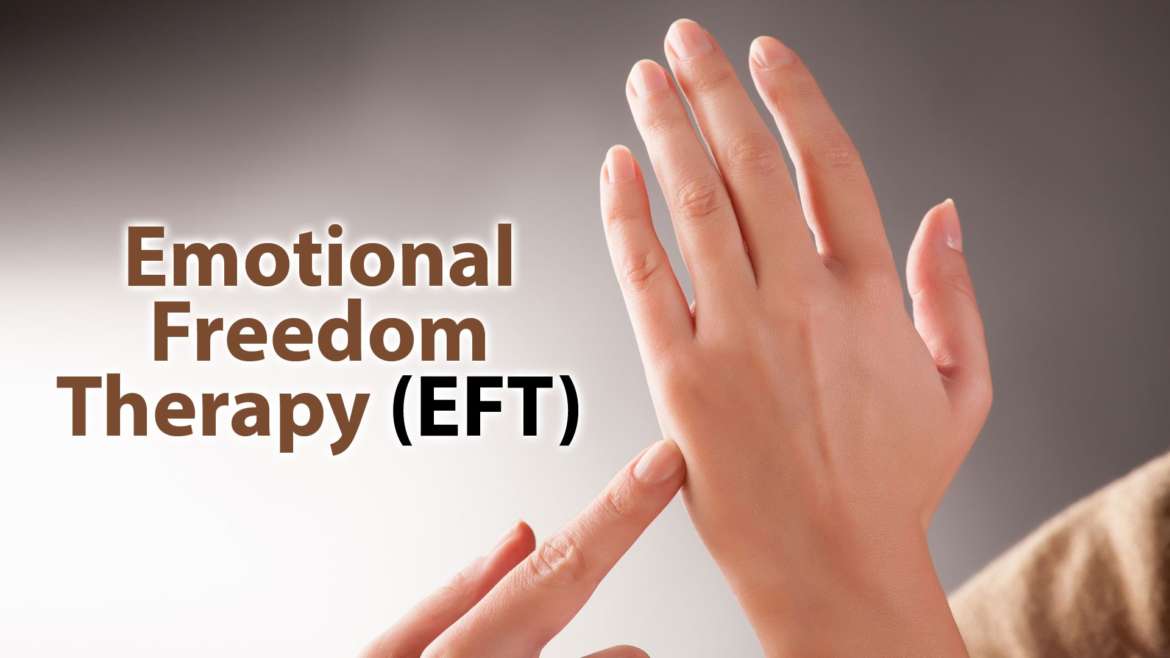The Emotional Freedom Techniques, or EFT, is the psychological acupressure technique I routinely use in my practice and most highly recommend to optimize your emotional health. Although it is still often overlooked, emotional health is absolutely essential to your physical health and healing — no matter how devoted you are to the proper diet and lifestyle, you will not achieve your body’s ideal healing and preventative powers if emotional barriers stand in your way.
EFT is very easy to learn, and will help you:
- Remove Negative Emotions
- Reduce Food Cravings
- Reduce or Eliminate Pain
- Implement Positive Goals
EFT is a form of psychological acupressure, based on the same energy meridians used in traditional acupuncture to treat physical and emotional ailments for over 5,000 years, but without the invasiveness of needles. Instead, simple tapping with the fingertips is used to input kinetic energy onto specific meridians on the head and chest while you think about your specific problem — whether it is a traumatic event, an addiction, pain, etc. — and voice positive affirmations.
This combination of tapping the energy meridians and voicing positive affirmation works to clear the “short-circuit” — the emotional block — from your body’s bioenergy system, thus restoring your mind and body’s balance, which is essential for optimal health and the healing of physical disease.
Some people are initially wary of these principles that EFT is based on — the electromagnetic energy that flows through the body and regulates our health is only recently becoming recognized in the West. Others are initially taken aback by (and sometimes amused by) the EFT tapping and affirmation methodology, whose basics you will learn here.
But keep in mind that, more than any traditional or alternative method I have used or researched, EFT works. I have witnessed the results in my patients since deciding to use EFT exclusively in June of 2001. Indeed, because of its very high rate of success, the use of EFT has spread rapidly, and medical practitioners employing EFT can now be found in every corner of the country and the wo
- Church, D. (2013). The EFT manual (3rd ed.). Santa Rosa, CA: Energy Psychology Press.
- Clond, M. (2016). Emotional Freedom Techniques for anxiety: A systematic review with meta-analysis. Journal of Nervous and Mental Disease, 204(5), 388–395. doi:10.1097/NMD.0000000000000483
- Clond, M., (2016). Emotional Freedom Techniques for Anxiety: A Systematic Review With Meta-analysis. Journal of Nervous and Mental Disease, 204(5), 388-395. doi:10.1097/NMD.0000000000000483.
- Nelms, J. & Castel, D. (2016). A systematic review and meta-analysis of randomized and non-randomized trials of Emotional Freedom Techniques (EFT) for the treatment of depression. Explore: The Journal of Science and Healing, 13(6), 416-426. doi:10.1016/j.explore.2016.08.001
- Church, D., & Feinstein, D. (2017). The manual stimulation of acupuncture points in the treatment of post-traumatic stress disorder: A review of Clinical Emotional Freedom Techniques. Medical Acupuncture, 29(4), 1–12. doi:10.1089/acu.2017.1213
- Sebastian, B., & Nelms, J. (2016). The effectiveness of Emotional Freedom Techniques in the treatment of posttraumatic stress disorder: A meta-analysis. Explore: The Journal of Science and Healing, 13(1), 16-25. doi:10.1016/j.explore.2016.10.001
- Feinstein, D. (2012). Acupoint stimulation in treating psychological disorders: Evidence of efficacy. Review of General Psychology, 16(4), 364-380. doi:10.1037/a0028602
- Kalla, M., Simmons, M., Robinson, A., & Stapleton, P. (2017). Emotional freedom techniques (EFT) as a practice for supporting chronic disease healthcare: A practitioners’ perspective. Disability and Rehabilitation,1–9. doi:10.1080/09638288.2017.1306125
- Varvogli, L., & Darviri, C. (2011). Stress management techniques: Evidence-based procedures that reduce stress and promote health. Health Science Journal, 5(2), 74-89.
- Yuniarti, Y., Suwondo, A., Runjati, R., Maharani, S. I., Ofiwijayanti, H., & Anastasia, S. (2016, May). Influence of Spiritual Therapy Emotional Freedom Technique (SEFT) on cortisol levels and immunoglobulin E (study of anxiety in pregnant women in independent practice midwives Semarang). ASEAN/Asian Academic Society International Conference Proceeding Series,4th annual. Retrieved from http://aasic.org/proc/aasic/article/view/193
- D., & Church, D. (2010). Modulating gene expression through psychotherapy: The contribution of non-invasive somatic interventions. Review of General Psychology, 14(4), 283-295.
- Thomas, R. M., Cutinho, S. P., & Aranha, D. M. S. (2017). Emotional Freedom Techniques (EFT) reduces anxiety among women undergoing surgery. Energy Psychology: Theory, Research, and Treatment, 9(1), 18–25. doi:10.9769/EPJ.2017.9.1.RT
- Church, D., & Brooks, A. J. (2010). The effect of a brief EFT (Emotional Freedom Techniques) self-intervention on anxiety, depression, pain and cravings in healthcare workers.Integrative Medicine: A Clinician’s Journal, 9(5), 40-44.
- Stapleton, P., Bannatyne, A., Chatwin, H., Urzi, K.-C., Porter, B., & Sheldon, T. (2017). Secondary psychological outcomes in a controlled trial of Emotional Freedom Techniques and cognitive behaviour therapy in the treatment of food cravings. Complementary Therapies in Clinical Practice, 28,136-145. doi:10.1016/j.ctcp.2017.06.004
- Church, D., De Asis, M., & Brooks, A. J. (2012). Brief group intervention using EFT (Emotional Freedom Techniques) for depression in college students: A randomized controlled trial.Depression Research and Treatment, 2012, 1-7. doi:10.1155/2012/257172.
- Brattberg, G. (2008). Self-administered EFT (Emotional Freedom Techniques) in individuals with fibromyalgia: A randomized trial.Integrative Medicine: A Clinician’s Journal, 7(4), 30-35.
- Rowe, J. (2005). The effects of EFT on long-term psychological symptoms.Counseling and Clinical Psychology, 2(3), 104-110.
- Church, D., & Nelms, J. (2016). Pain, range of motion, and psychological symptoms in a population with frozen shoulder: A randomized controlled dismantling study of Clinical EFT (Emotional Freedom Techniques). Archives of Scientific Psychology, 4(1), 38-48. doi:10.1037/arc0000028
- Bougea, A. M., Spandideas, N., Alexopoulos, E. C., Thomaides, T., Chrousos, G. P., & Darviri, C. (2013). Effect of the Emotional Freedom Technique on perceived stress, quality of life, and cortisol salivary levels in tension-type headache sufferers: A randomized controlled trial.Explore: The Journal of Science and Healing, 9(2), 91-99. doi:10.1016/j.explore.2012.12.005
- Hajloo, M., Ahadi, H., Rezabakhsh, H., & Mojembari, A. K. (2014). Investigation on Emotional Freedom Technique effectiveness in diabetic patients’ blood sugar control. Mediterranean Journal of Social Sciences, 5(27 P3), 1280. doi:10.5901/mjss.2014.v5n27p1280


